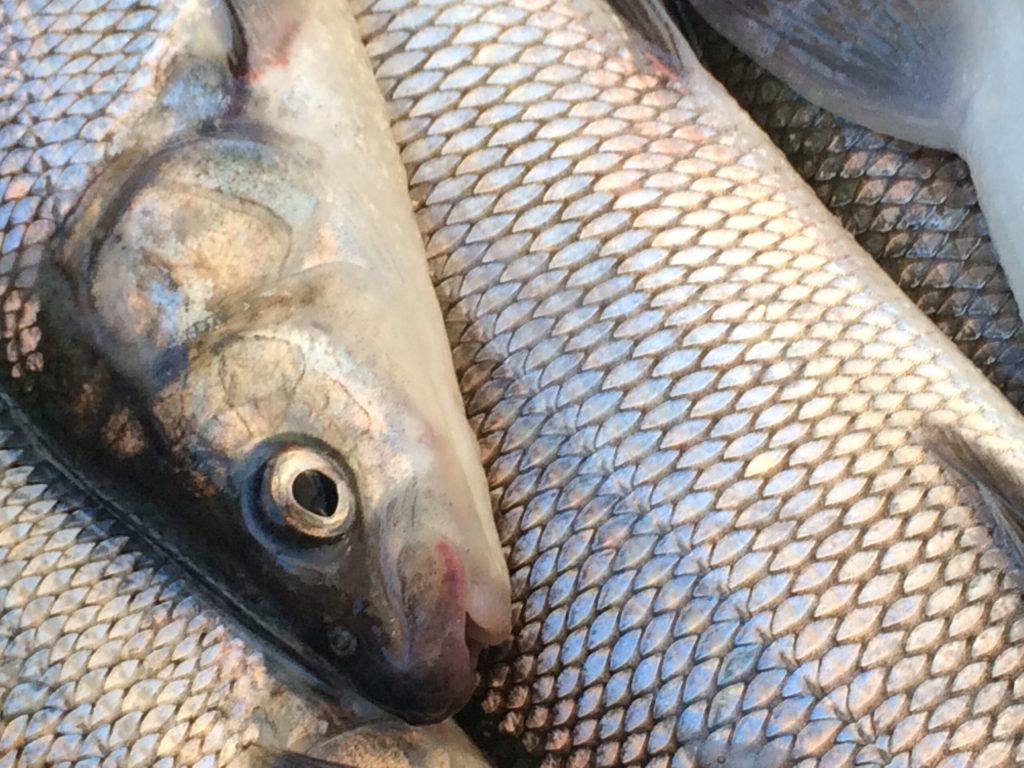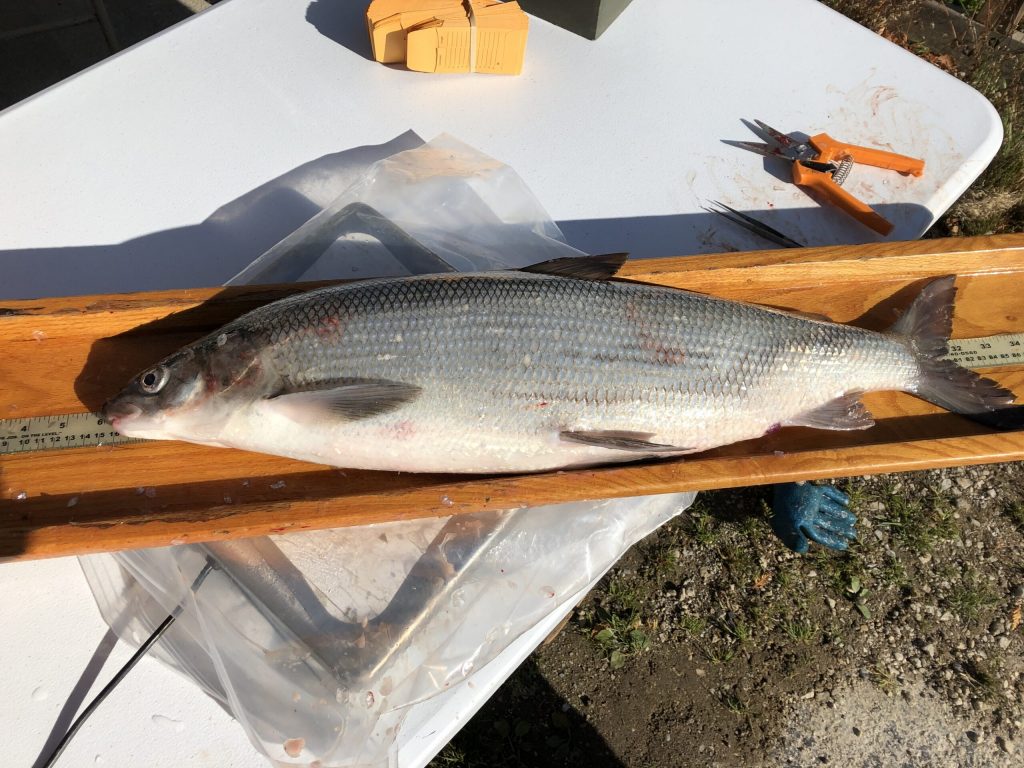The Decline of Lake Michigan Whitefish
Fears the fish might disappear. Harvest down by nearly 90% since 1999.

The commercial harvest of lake whitefish in Lake Michigan has dropped to its lowest level since 1990 as the population has declined. Photo courtesy of Wisconsin DNR
State regulators say the commercial harvest of lake whitefish in Lake Michigan has reached its lowest level since 1990, and some fisheries biologists fear the species might largely disappear in parts of the lake.
In Wisconsin, the commercial harvest of lake whitefish has dropped from a peak of about 1.7 million pounds in 1999 to less than 200,000 pounds last year in all of Lake Michigan — a decline of nearly 90 percent.
“Without that replenishment of young fish into the population, we are seeing a pretty steep decline, and a continuous decline, in the abundance of lake whitefish in Lake Michigan,” Hansen said.
The most recent estimates show the spawning population had dropped to about 10 million pounds in 2021 — less than half the peak of 25 million pounds in the early- to mid-2000s.
While the fish face multiple challenges, Hansen said biologists believe invasive mussels are the greatest driver of their decline. The filter-feeding zebra and quagga mussels have disrupted the food chain by gobbling up food that larval whitefish rely on to survive.
Jason Smith, a Great Lakes fisheries biologist with Bay Mills Indian Community in Michigan, said he fears lake whitefish could disappear from parts of Lake Michigan within the next five to 10 years.
“The decline is incredibly steep, incredibly fast, and there is really no end in sight,” Smith said.
The decline has prompted state and tribal regulators in Michigan to set its most conservative limits for commercial harvest on record this year in central Lake Michigan, according to Bridge Michigan. In Wisconsin, Hansen said the DNR is updating its population estimates this year to inform harvest levels for the 2026 season.
As whitefish decline, commercial fishers adapt
Charlie Henriksen co-owns Henriksen Fisheries in Door County. When the fish reached peak levels in Lake Michigan and northern Green Bay, he said they harvested about 300,000 pounds of whitefish. Now, Henriksen said they catch about 150,000 to 200,000 pounds.
“Lake Michigan and northern Green Bay, there’s less fish up there, and they’re not there all the time like they used to be,” Henriksen said.

The Wisconsin DNR plans to update population estimates and harvest levels for whitefish for the 2026 season. Photo courtesy of Wisconsin DNR
The decline has prompted the business to shift more to processing fish for sale at local restaurants. It’s also changed when and where they harvest fish. As numbers have declined in Lake Michigan, Henriksen said they primarily fish now in southern Green Bay due to a resurgence of the fish there beginning around the early 2000s.
By 2021, Hansen said the spawning population of lake whitefish in Green Bay was nearly double that of Lake Michigan, at roughly 19 million pounds. After being wiped out there in the late 1800s, the revival of the fish in the bay was due in part to more whitefish spawning in the Menominee, Oconto, Peshtigo and Fox rivers.
Hansen said the self-sustaining population might have been driven by remnant fish populations in Green Bay or a spillover of whitefish from Lake Michigan when fish were at their peak. He added that efforts to clean up historical pollution from paper mills following the passage of the Clean Water Act in 1972 also played a role in providing good spawning conditions.

Lake whitefish have declined up to 80 percent in Lakes Michigan and Huron. Photo courtesy of Wisconsin DNR
Michigan tribes, agencies seek to replicate success in Green Bay
In Michigan, tribes are working with the Nature Conservancy and Michigan Department of Natural Resources to replicate those results by stocking whitefish in rivers that flow into Lakes Michigan and Huron. But Smith said he doesn’t expect it to save whitefish. He noted most whitefish in the lake are more than 20 years old, and they live about 30 years.
Lake whitefish have declined up to 80 percent in Lakes Michigan and Huron due largely to invasive mussels introduced through the ballast water of ships on the Great Lakes. The fish also face threats from habitat loss, pollution and warming winters due to the use of fossil fuels that contribute to climate change.
Henriksen noted that researchers at the University of Wisconsin-Milwaukee and others are experimenting with removal of quagga mussels near Milwaukee, Sleeping Bear Dunes National Lakeshore and Muskegon, Michigan. Early results show that mussels don’t come back right away.
Meanwhile, Hansen said the DNR plans to present updated harvest levels to the Natural Resources Board for approval by the end of the year. Both Henriksen and Smith say overfishing is not the issue.
“This is not an over-harvest problem,” Smith said. “This is an ecosystem problem.”
Decline of whitefish in Lake Michigan sparks fears that the fish might disappear was originally published by Wisconsin Public Radio.
If you think stories like this are important, become a member of Urban Milwaukee and help support real, independent journalism. Plus you get some cool added benefits.






















Would an expert help me understand how Zebra and Quagga mussels in the ballasts of ships entering the Great Lakes from the Atlantic Ocean and St. Lawrence Seaway can “climb” from the lower altitudes on the east coast up to the western Great Lakes through the Seaway? Wouldn’t such ballast be flushed out in their entry points in the east, and no longer be in their tanks by the time they’ve reached the upper Lakes? Are biocides like Zequanox used or required in the ballasts of these ships?
Mussel veligers — their larval young — were in the tanks free-floating in the water itself. Prior to ~2006 ballast water tanks of ocean-going freighters were not required to be exposed to saltwater exchange during transoceanic voyages, a method that is currently considered to kill many potential invasive species prior to introduction in new systems. When ballast water from these ships was discharged to balance off ships in the Great Lakes, species including quagga and zebra mussels found the Great Lakes bottom substrate a good environment to set up shop eating, excreting, and reproducing. Known as “aquatic hitchhikers,” they can also subsequently move via ships not originally ocean-going, and this is also why there are stringent restrictions on boats moving to/from places like Lake Mead where trailers of recreational boats are known to be inspected — so as to prevent the spread into new areas that would be sensitive to disruption. Like many species considered pests, mussels are very good at colonizing new habitats and rapidly reproducing from a very small founding population. There is a lot google-able out there that can lead you to more nuanced understanding about these mussels and other aquatic invasive species (AIS). Opened ~1959, the St. Lawrence Seaway was like a superhighway to promote the movement of species across (by breaching) natural hydrological barriers (think: bypassing Niagara Falls). It’s not that the mussels “climb” up the Seaway, but think more about when you see mold on old cheese radiating outward from spots or other such patterns of infestation and spread. The Great Lakes ports were the loci of spread and that is attributed in large part to ballast water discharges from ships in the 1980s – 2000s. Dan Egan has a great book that can provide more context, Death & Life of the Great Lakes, available in most public libraries. Sea Grant is another good source to consult. Or Wisconsin DNR. Re: biocides, there had been debate about requiring stricter treatment protocols for ballast water and I am not up on the very latest policies, but treating ballast water now would help prevent the spread of new species, but unfortunately not affect the trillions of mussels that currently carpet the bottom of the Great Lakes. The recent Canadian documentary, All Too Clear, considers these dynamics re: whitefish as well including high-quality underwater video footage and you may find it of interest. Mussels have dramatically transformed Great Lakes food webs. Beyond the Great Lakes, they remain a major concern with significant associated direct and indirect costs to manage. Here is an NPS source re: Lake Mead that may be of interest to general audiences to understand one manifestation of a very complex and dramatic dynamic: https://www.nps.gov/lake/learn/quagga-mussel.htm And here is the IMO’s perspective: https://www.imo.org/en/mediacentre/hottopics/pages/bwm-default.aspx
Wow, thank you so very much! Greatly appreciate the detail!!